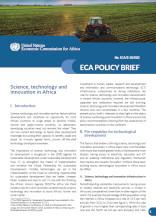ECA Policy Brief - Science, technology and innovation in Africa

Science, technology and innovation are key factors behind development and constitute an opportunity for most African countries to surge ahead to become middle-income and upper-income countries. As latecomers, developing countries need not reinvent the wheel. They can use current technology to tackle their development challenges by building their capacity to identify, adapt and adopt, on mutually agreed terms, proven off-the-shelf technology developed elsewhere.
The importance of science, technology and innovation for development is recognized in the 2030 Agenda for Sustainable Development, under Sustainable Development Goal 17, to strengthen the means of implementation and revitalize the Global Partnership for Sustainable Development. Frontier technologies can aid in the implementation of the Goals by providing “opportunities for sustainable development that are better, cheaper, faster, scalable and easy to use”.2 In line with this thinking, the African Union’s Agenda 2063: The Africa We Want contains calls for a skills revolution underpinned by science, technology and innovation to boost Africa’s human and social capital.
Investment in human capital, research and development and information and communications technology (ICT) infrastructure, underpinned by strong institutions, are vital for science, technology and innovation development. In several African countries, however, the infrastructure, capacities and institutions required are still evolving. Science, technology and innovation development therefore remains slow and concentrated in a few countries. The present policy brief is intended to shed light on the status of science, technology and innovation in Africa and provide policy recommendations drawing from the experiences of best practice countries on the continent.